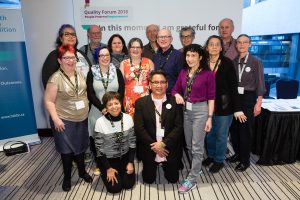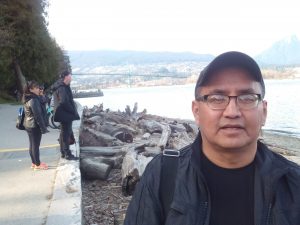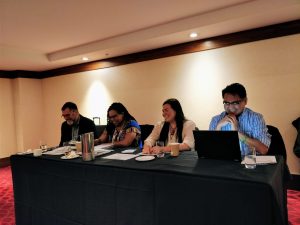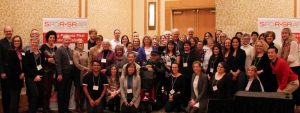Posted
Categories: My Experience
Our second guest blog post for National Volunteer Week is from patient partner Chad Dickie. In this piece, Chad discusses the importance of using your voice to make a difference and explains how patient perspectives can contribute to positive changes in the health care system.
I first heard about the Patient Voices Network when I attended the UBC Centre for Health Services and Policy Research (CHSPR) Conference March 2017 as a patient-partner. It piqued my interest, however, due to other commitments I set the idea aside. Then I was part of a panel on Indigenous Health at the Vancouver Island Health Authority “Five Days in May” event in Victoria. There, I heard more about PVN and met a PVN member, Douglas Laird. He recommended that I check out the website, so I did. I liked what I saw, so I signed up and started getting the bi-weekly Engagement Opportunities emails.
Right away I saw an opportunity with Vancouver Island Health Authority that really interested me and fit my background – Patient Assessors, Site Environmental Assessments. I applied and was accepted!
There were many opportunities to get involved and share my experience as a patient, a caregiver, a non-professional and non-expert in many areas of patient safety and patient quality improvement. All I had was lived experience. I thought, “I would like to share some of my experiences as a First Nations man, as a person who has lived on a Reserve in the Far North (Fort Nelson, BC) but now lives in the city, as a caregiver and as a person living with a manageable chronic disease.” Lots to think about, huh? I applied for engagement opportunities that interested me and where I thought I could contribute meaningfully and effectively.

I’ve been very deliberate in what I want to engage in, and I put a lot of thought into why I want to engage in each opportunity, and what my expectations are. I consider whether my participation will make a difference, if it’s an area I need to know more about, or if it’s relevant to the many communities I’m a part of. I share my thoughts, ideas and experiences openly and honestly. I have met many great people – some with very challenging patient and health care experiences – and I’m a better person for hearing their stories.

I’ve learned the words the professionals and experts use, as well the basics of complex concepts regarding funding, care delivery, health economics, ethics and regulations. I’ve learned more about patient-oriented research and why it’s important to make the patient the centre of care, not the disease or a “magic bullet” as a sole remedy. Recognizing the social determinants of health and structural institutional barriers patients, caregivers, providers and organizations face repeatedly provides new insight on the complexity of health and health care issues.
There are many barriers to adequate, comprehensive, integrated care in our health system. Understanding public and individual health from the context of the social determinants of health opened my eyes to the individual voices that are invaluable in reforming how health care is delivered. Patient voices need to part of the dialogue, planning and implementation of programs and services to improve health care in Canada.
I volunteer for many things because I value the care, services and opportunities that got me healthy after some serious health issues. I feel it is important to give back, something my father instilled in me. I didn’t know I was this resilient.
In the past year, my patient engagement experience includes: Island Health “Patient Advisor Led Environmental Site Assessments” project, BC SUPPORT Unit Vancouver Island Regional Centre Oversight Committee, BC Primary Health Care Research Network Patient Advisory Committee, Island Health Leaders Forum patient-partner, Centre for Health Services & Policy Research Conference 2018, Quality Forum 2018 attendance, BC Patient Safety and Quality Council (BCPSQC) Clinicians Quality Academy patient panel, BCPSQC Quality Academy patient panel, Canada Health Infoway Partnership Conference November 2017 in Calgary
and the BCPSCQ Change Agent Workshop.
My favourite experience so far would have to be the Patient Advisor Led – Site Environmental Assessment Project with Island Health in Victoria, BC.

How many other patients and caregivers are out there with similar unheard stories, of diverse patient experiences and interactions with health and service providers – good and bad – that can inform patient-centred and patient-focused care? I would like to hear their stories, too. Your lived experience matters.
Voices like mine can contribute to improving ideas and how things get done in clinics, on the ground, and in the real world to make the quality of experience just a little bit better for the next person. It’s about progress, iterative problem-solving and solution-finding from point of ethical, healthful and practical curiosity.

I hope PVN continues to inform patients, providers, regulators and policy- and decision-makers how important the receivers of health care services and supports are to developing protocols, as well as understanding what works for patients and their families. I also hope PVN can emphasize the necessity of including patient voices from the start in research, and “closing the loop” with engagement activities, to ensure patient contributions are valued and recognized.
Author: Chad Dickie


